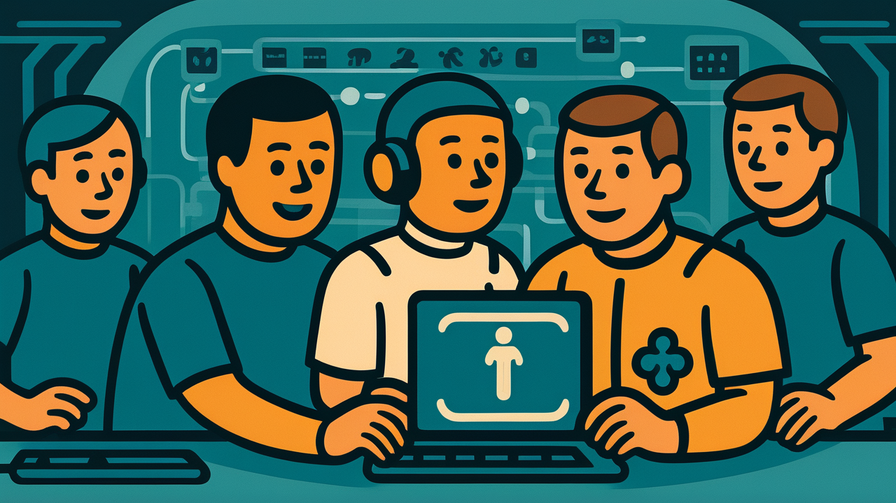[Disclaimer] This article is reconstructed based on information from external sources. Please verify the original source before referring to this content.
News Summary
The following content was published online. A translated summary is presented below. See the source for details.
Google has announced significant updates to Gemini Code Assist, its AI-powered coding assistant that competes with GitHub Copilot and Amazon CodeWhisperer. The biggest announcement is “Agent Mode,” which allows the AI to work more autonomously on coding tasks. Instead of just suggesting code line-by-line, Agent Mode can understand complex requirements and generate entire functions, classes, or even small applications. The update also includes enhanced IDE (Integrated Development Environment) integration, making the AI assistant work more seamlessly with popular coding tools like Visual Studio Code, IntelliJ IDEA, and Android Studio. These improvements mean developers can describe what they want in plain English, and the AI handles more of the implementation details automatically. Google claims this will dramatically speed up software development while maintaining code quality.
Source: Google Blog
Our Commentary
Background and Context

To understand why this matters, let’s break down what these tools do. AI coding assistants are like super-smart autocomplete for programmers. When developers write code, these tools predict what they’re trying to do and suggest the next lines. It’s similar to how your phone predicts the next word when you’re texting, but much more sophisticated.
Gemini Code Assist is Google’s entry into this competitive market. The name “Gemini” comes from Google’s latest AI model family, which powers everything from search to their Bard chatbot. By applying this AI to coding, Google aims to make programming faster and more accessible.
An IDE (Integrated Development Environment) is like Microsoft Word but for code. Popular IDEs include Visual Studio Code (Microsoft), IntelliJ IDEA (JetBrains), and Android Studio (Google). These programs help developers write, test, and debug their code all in one place.
Expert Analysis
The introduction of “Agent Mode” represents a fundamental shift in how AI assists programming. Traditional coding assistants are reactive – they wait for you to start typing, then suggest completions. Agent Mode is proactive – you describe what you want, and it creates the solution.
Imagine the difference between:
– Old way: “As I type each line, suggest the next line”
– Agent Mode: “I need a function that sorts student grades and calculates the class average”
With Agent Mode, the AI understands the entire task and generates complete, working code. This is huge for several reasons:
1. Speed: Tasks that took hours might take minutes
2. Accessibility: People with less coding experience can build more complex programs
3. Focus: Developers can concentrate on big-picture design rather than syntax details
However, experts warn about potential downsides. If developers rely too heavily on AI, they might lose fundamental coding skills. There’s also the risk of AI generating code with subtle bugs or security vulnerabilities that humans might miss.
Additional Data and Fact Reinforcement
The AI coding assistant market is exploding:
– GitHub Copilot: 1.3 million paid subscribers
– Market expected to reach $2.5 billion by 2027
– 70% of developers use some form of AI assistance
– Studies show 30-50% productivity gains with AI tools
Gemini Code Assist features:
– Supports 20+ programming languages
– Integrates with major cloud platforms
– Offers enterprise security features
– Pricing: $19/month for individuals, $29/month for enterprises
Competition comparison:
– GitHub Copilot: First mover, largest user base
– Amazon CodeWhisperer: Free tier, AWS integration
– Tabnine: Privacy-focused, on-premise options
– Replit Ghostwriter: Built into online IDE
Related News
The AI coding revolution continues accelerating:
– Microsoft reported GitHub Copilot generates 46% of code for users who adopt it
– Amazon made CodeWhisperer free for individual developers
– Apple announced it’s developing its own AI coding assistant for Xcode
– OpenAI demonstrated GPT-4 writing entire applications from descriptions
Concerns are also growing:
– Universities worry students aren’t learning fundamentals
– Companies debate whether AI-generated code creates legal liabilities
– Security researchers found AI sometimes suggests vulnerable code patterns
– Labor groups discuss how AI might change programming jobs
Summary

Google’s updates to Gemini Code Assist, especially the new Agent Mode, represent a significant leap toward AI that doesn’t just help write code but can independently solve programming problems. This shift from AI as assistant to AI as autonomous agent could fundamentally change how software gets built.
For students learning to code, these tools present both opportunities and challenges. On one hand, AI can accelerate learning by providing instant examples and explanations. On the other hand, there’s a risk of becoming dependent on AI without understanding underlying concepts – like using a calculator before learning arithmetic.
The broader implications are profound. If AI can handle routine coding tasks, human developers can focus on creativity, design, and solving complex problems. But this also means tomorrow’s programmers need different skills – less memorization of syntax, more understanding of systems and architecture.
As these tools improve, we’re heading toward a future where the ability to clearly communicate ideas to AI becomes as important as traditional coding skills. The question isn’t whether AI will change programming, but how quickly and completely that transformation will occur.
Public Reaction
Developer communities show mixed reactions. Many experienced programmers embrace the productivity boost, while others worry about job security. Coding bootcamp students seem especially excited, seeing AI as a way to compete with computer science graduates. Teachers express concern about how to assess student work when AI can complete assignments.
Frequently Asked Questions
Q: Will AI replace programmers?
A: Unlikely in the near future. AI assists with coding but can’t replace human creativity, problem-solving, and understanding of business needs. Think of it like spell-check for writers – helpful but not a replacement.
Q: Should I still learn to code if AI can do it?
A: Absolutely! Understanding code remains crucial. It’s like how calculators didn’t eliminate the need to understand math. AI helps you code faster, but you need knowledge to guide it and verify its output.
Q: Is AI-generated code safe to use?
A: Generally yes, but always review it. AI can make mistakes or suggest outdated patterns. Think of it as a very smart intern – helpful but needs supervision.
Q: How much does Gemini Code Assist cost?
A: $19/month for individuals, $29/month for businesses. Students might get discounts through their schools. Free alternatives exist but with fewer features.


